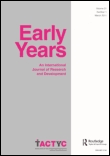
Early Years
Scope & Guideline
Innovating Practices for Young Learners
Introduction
Aims and Scopes
- Early Childhood Pedagogy:
Exploring diverse pedagogical approaches and their effectiveness in fostering children's learning and development. This includes play-based learning, inquiry-based strategies, and the integration of digital tools. - Professional Development and Leadership:
Focusing on the professional growth of early childhood educators, including leadership styles, emotional labor, and collaborative practices within educational communities. - Inclusive Education:
Investigating practices that promote inclusion for children with diverse needs, including those with disabilities, and how educators can effectively engage families in this process. - Cultural and Contextual Influences:
Examining the impact of cultural, social, and economic factors on early childhood education practices, and how these elements shape children's experiences and educators' approaches. - Policy and Advocacy:
Analyzing early childhood education policies at national and international levels, with a focus on how these frameworks affect practice and the well-being of children and families. - Child Development and Well-being:
Researching aspects of child development, including emotional, social, cognitive, and physical growth, and how these domains intersect with educational practices.
Trending and Emerging
- Digital Literacy and Technology Integration:
An increasing number of studies are exploring how digital tools can be integrated into early childhood education in meaningful ways, enhancing children's learning experiences and engagement. - Mental Health and Well-being:
There is a growing focus on the mental health and well-being of both educators and children, particularly in light of recent global challenges such as the COVID-19 pandemic. Research is addressing how to support emotional resilience and mental health in early education settings. - Family Engagement and Partnerships:
Emerging themes highlight the importance of strong partnerships between families and educators, recognizing families as integral to the educational process and children's development. - Critical Pedagogy and Social Justice:
An increasing trend towards examining issues of equity, diversity, and inclusion in early childhood education, with a focus on social justice and the implications for practice. - Play as a Context for Learning:
Research is increasingly framing play not just as a method of learning but as a vital context that influences children's cognitive, social, and emotional development.
Declining or Waning
- Traditional Assessment Methods:
There has been a noticeable decline in the emphasis on conventional assessment practices in early childhood settings. Instead, there is a growing preference for holistic and formative assessment methods that better capture children's learning processes. - Standardized Curriculum Models:
The journal has seen a reduced focus on rigid, standardized curriculum frameworks in favor of more flexible, child-centered approaches that allow for individualization and responsiveness to children's needs. - Behaviorist Approaches to Learning:
Research aligning with behaviorist theories, which focus on direct reinforcement and rote learning, appears to be waning. The journal now favors constructivist and socio-cultural theories that emphasize active learning and social interaction. - Isolation of Educators' Roles:
There is less emphasis on the isolated role of the educator as a singular authority. Instead, the discourse has shifted towards collaborative practices that involve families and communities in the educational process. - Emphasis on Traditional Play Types:
While play remains a critical focus, there is a decline in research centered solely on traditional forms of play. The exploration of diverse, modern play experiences and their implications for learning has taken precedence.
Similar Journals
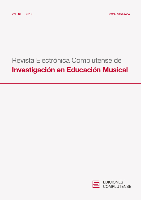
Revista Electronica Complutense de Investigacion en Educacion Musical-RECIEM
Elevating Music Education Research to New HeightsRevista Electronica Complutense de Investigacion en Educacion Musical (RECIEM) is a distinguished open-access journal published by UNIV COMPLUTENSE MADRID, SERVICIO PUBLICACIONES, dedicated to advancing research in the fields of music education and pedagogy. Since its inception in 2004, RECIEM has provided a vital platform for scholars, educators, and researchers to disseminate their findings and foster discussions that bridge the gap between theory and practice in music education. With an impressive ranking in the top quartile for music (Q1) and a respectable Q3 ranking in education for 2023, RECIEM is a pivotal resource for those engaged in the interdisciplinary nexus of arts and education. The journal's commitment to open access ensures that its scholarly content is available to a global audience, enhancing its impact and fostering collaboration among professionals in the music education community. The journal covers diverse topics within music and education, aiming to inspire innovation and reflect contemporary developments in teaching methodologies and musicological research. RECIEM’s continued growth—represented by its robust Scopus ranks and the convergence of years from 2004 to 2024—underscores its relevance and significance in shaping the future of music education research.

Journal of Early Childhood Research
Bridging gaps in early childhood understanding.The Journal of Early Childhood Research, published by SAGE Publications Inc, is a leading academic journal dedicated to advancing the field of early childhood education and development. With a focus on developmental and educational psychology, education, and health social sciences, this journal serves as a vital platform for researchers, educators, and policymakers to share innovative studies and impactful findings that shape the experiences of young children. Since its inception in 2003, the journal has maintained an impressive reputation, achieving Q2 status in multiple categories within the 2023 category quartiles and earning a solid standing within Scopus rankings. Its rigorous peer-review process ensures high-quality research dissemination, and while it is not currently an open-access journal, it offers various access options to support broader readership. By bridging theory and practice, the Journal of Early Childhood Research plays a crucial role in informing current pedagogical practices and enhancing understanding of early childhood development, making it an essential resource for professionals and scholars alike.

He Kupu
Fostering dialogue and innovation in educational research.He Kupu is a prominent academic journal published by the New Zealand Tertiary College, focused on advancing the field of educational research and discourse in Aotearoa New Zealand. With the ISSN 1179-6812, this journal provides a vital platform for scholars, educators, and practitioners to engage with contemporary issues, practice innovations, and collaborative research findings that shape tertiary education and beyond. Although currently not listed as an open access journal, He Kupu plays a critical role in promoting indigenous perspectives and enhancing educational practices through its diverse range of articles, essays, and reviews. As a valuable resource for researchers and students alike, He Kupu contributes significantly to the ongoing discourse in higher education, making it an essential read for those committed to fostering educational excellence and cultural competence in New Zealand.
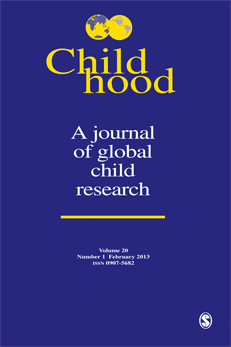
CHILDHOOD-A GLOBAL JOURNAL OF CHILD RESEARCH
Connecting Cultures Through Child ResearchCHILDHOOD: A Global Journal of Child Research is a leading peer-reviewed publication dedicated to advancing the field of child research, published by SAGE Publications Ltd in the United Kingdom. With an ISSN of 0907-5682 and an E-ISSN of 1461-7013, the journal has earned a prestigious reputation, securing a Q1 ranking in both Anthropology and Cultural Studies, along with commendable rankings in other social science categories. Spanning a convergence of impactful years from 1993 to 2024, CHILDHOOD aims to provide a multidisciplinary platform for researchers, educators, and practitioners to explore diverse perspectives on childhood and the experiences of children across the globe. Although it is not an open-access journal, it remains accessible to a wide audience through various institutional subscriptions and databases. As an influential resource in the social sciences, particularly within developmental and educational psychology, CHILDHOOD continues to shape discourse and inspire scholarship that critically engages with children's lives, cultures, and rights.
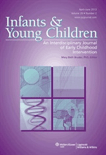
Infants & Young Children
Advancing Knowledge for Thriving FuturesInfants & Young Children is a pioneering journal established in 1988 and published by Lippincott Williams & Wilkins, focusing on the critical developmental phases of infancy and early childhood. With a commitment to advancing research in Developmental and Educational Psychology, Pediatrics, Perinatology and Child Health, as well as Psychiatry and Mental Health, this journal serves as an essential resource for professionals and scholars dedicated to understanding and enhancing the early years of life. As a member of the Q3 category in multiple relevant fields, it informs and stimulates discourse with its impactful scholarly articles, meeting the diverse needs of researchers, practitioners, and policymakers alike. Though access is not currently open, subscribers can expect high-quality, peer-reviewed research that underscores the importance of early experiences in shaping lifelong outcomes. Located in Philadelphia, this journal continues to make significant contributions to child health and education, aiming to bridge gaps in knowledge and ensure a foundation for thriving, healthy futures.
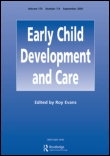
Early Child Development and Care
Empowering professionals with evidence-based research.Early Child Development and Care is an esteemed journal published by ROUTLEDGE JOURNALS, TAYLOR & FRANCIS LTD, dedicated to advancing the interdisciplinary understanding of early child development. With an ISSN of 0300-4430 and E-ISSN 1476-8275, the journal has established itself as a pivotal resource in the fields of Developmental and Educational Psychology and Pediatrics, holding a Q3 and Q2 ranking respectively in 2023. The comprehensive coverage from 1971 to the present encompasses critical research findings, theoretical discussions, and practical applications, catering to an audience of researchers, educators, and child care professionals. With a solid impact factor reflecting its relevance across disciplines, this journal aims to foster knowledge exchange and informed practices in child development and care, empowering its readers with evidence-based insights. Although not an open-access publication, it remains accessible to a wide array of institutions, ensuring that vital research contributes to the ongoing discourse in early childhood studies.

PSYCHOLOGIE IN ERZIEHUNG UND UNTERRICHT
Advancing understanding through psychological insights in education.PSYCHOLOGIE IN ERZIEHUNG UND UNTERRICHT, published by ERNST REINHARDT GMBH CO VERLAG, serves as a pivotal platform for research in the fields of Developmental and Educational Psychology. Since its inception, this esteemed journal has focused on disseminating groundbreaking insights and innovative practices from 1996 to the present, with expectations to continue through 2024. Despite its current ranking of Q4 in category quartiles and a Scopus rank of #309 out of 360, the journal remains a crucial resource for scholars, educators, and practitioners seeking to enhance their understanding of psychological principles within educational contexts. Situated in the vibrant academic landscape of Germany, the journal emphasizes both theoretical and practical perspectives, motivating interdisciplinary discussions that are vital in addressing contemporary challenges in education and human development. As the journal continues to evolve, it invites contributions that explore emerging trends, providing a rich source of information for both researchers and professionals dedicated to improving educational outcomes through psychological insights.
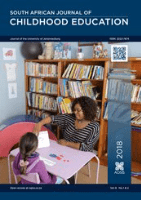
South African Journal of Childhood Education
Unlocking potential in childhood education through open access knowledge.South African Journal of Childhood Education, published by AOSIS, serves as a crucial platform for the dissemination of research focused on early childhood education and developmental psychology in South Africa and beyond. With an Open Access model initiated in 2011, it ensures that valuable insights and findings are accessible to a broad audience, fostering collaboration and innovation in educational practices. The journal's impact in the field is reflected in its rankings, placing it in Q3 and Q4 categories for Education and Developmental and Educational Psychology, respectively. It ranks at #824 out of 1543 in Social Sciences - Education and #240 out of 360 in Psychology, highlighting its relevance and academic rigor. By bridging theoretical perspectives with practical implications, the journal aims to advance understanding in childhood education, making it an essential resource for researchers, educators, and students committed to improving educational outcomes in early development.
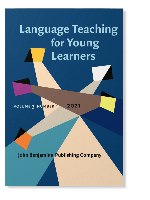
Language Teaching for Young Learners
Empowering educators to inspire young language learners.Language Teaching for Young Learners, published by John Benjamins Publishing Co, is a premier journal dedicated to enhancing the pedagogy of language acquisition in early childhood education. Since its inception in 2019, it has rapidly established itself within the research community, reflected by its high Scopus rankings—placing it in the 85th percentile for Language and Linguistics and the 84th percentile for Education. The journal aims to provide a platform for innovative research, practical insights, and theoretical discussions surrounding the teaching of languages to young learners, thus contributing significantly to the fields of Education and Linguistics. With an open access model currently unavailable, it caters to a diverse global audience, including researchers, educators, and policy-makers, keen on improving pedagogical practices. Located in the Netherlands, the journal's commitment to academic excellence is evident through its Q1 and Q2 rankings in Linguistics and Language and Education respectively, encouraging continual discourse in cultivating effective language education practices.

Infancias Imagenes
Shaping Dialogues Through Children's ImageryWelcome to Infancias Imagenes, a premier journal dedicated to the interdisciplinary study of children's images and representations, published by UNIV DISTRITAL FRANCISCO JOSE CALDAS. Since its inception in 2006, this Open Access journal has served as a vital platform for researchers, educators, and practitioners to explore the multifaceted dimensions of childhood through visual culture, pedagogy, and social discourse. With its commitment to disseminating high-quality research, Infancias Imagenes plays a significant role in shaping the academic landscape, fostering dialogue among stakeholders across various disciplines. As an emerging voice in the field, the journal invites contributions that not only advance scholarly discussion but also engage with pressing societal issues surrounding childhood, ensuring its relevance in both academic and professional contexts. The journal is accessible online, enhancing visibility and allowing for a broader audience to engage with cutting-edge research in children's image studies.